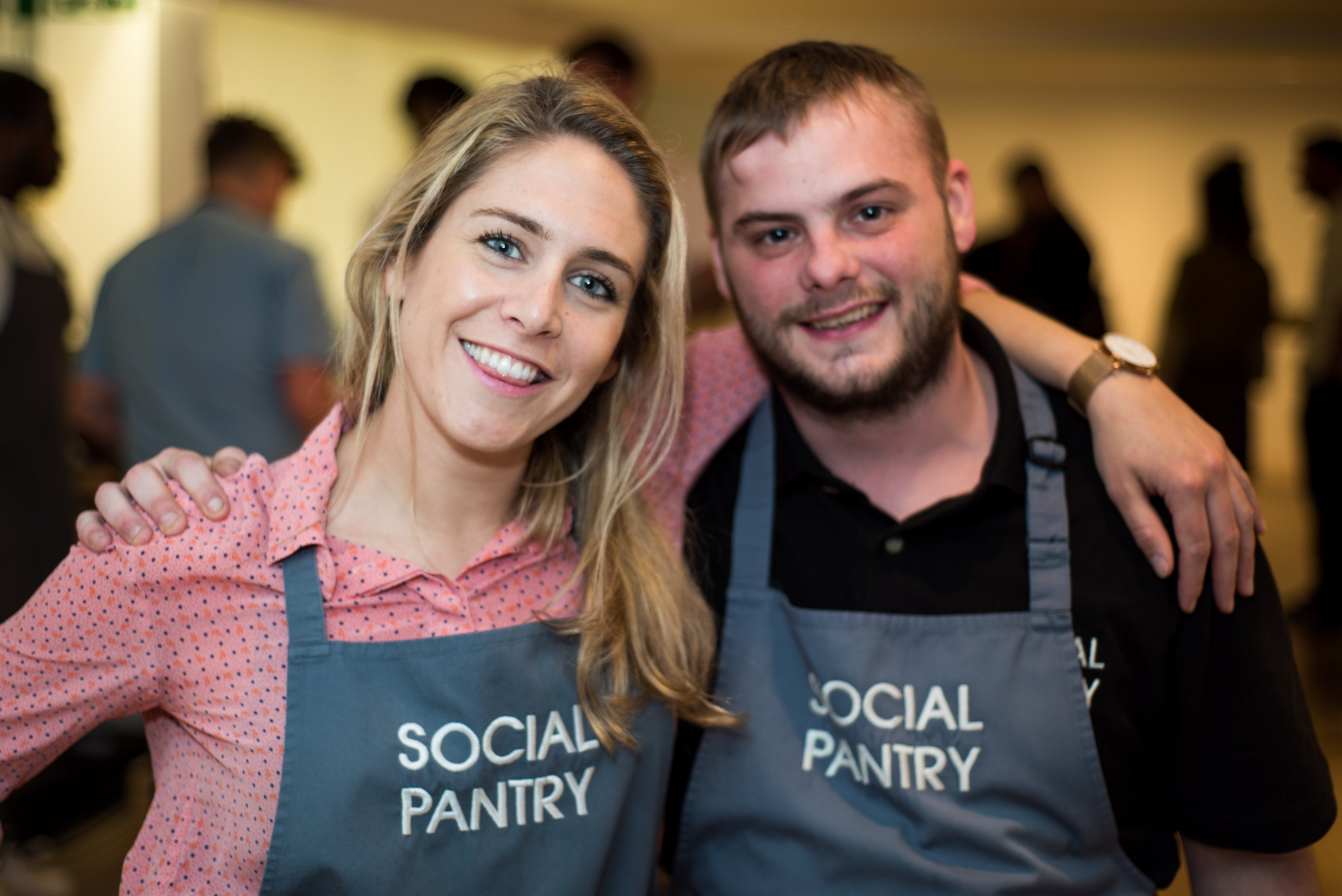
It’s a hot and glorious Thursday afternoon when I find myself at Wilderness Festival in Oxford, surrounded by bejeweled revellers with some of the poshest accents I’ve ever heard. Mary Berry and Sophie Ellis-Bextor can be seen mingling in the VIP area of the Veuve Clicquot tent. Yummy mummies and dishy daddies ply their children with organic fruit ice pops. I sip on a £12.50 Patron tequila cocktail, and think of how this must be the bougiest place I’ve ever set foot in. But away from the almost overwhelming froufrou of the festival, a most unlikely discussion is being had: what is prison food like?
The question emanates from a panel led by Alex Head, the founder of Social Pantry, a London caterer that provides ex-offenders with the opportunity to reintegrate into society. She’s been joined by Lucy Vincent of Food Behind Bars, a charity working to improve food in prison, and Rob Morrison, an ex-offender and co-host of the Banged Up podcast.
We hear Morrison talk about how awful the food was during his time in jail; how “hangry” so many men were. Vincent, meanwhile, outlines the challenges of coming up with a nutritionally valuable menu on a meagre budget for hundreds of prisoners. Head acknowledges the elephant in the room. “It’s pretty unbelievable that we’re here at Wilderness Festival, talking about food in prison and prisoners,” she says. “The conversation has come so far.”
While the conversation has indeed evolved for the better, those who emerge from prison still face hurdle after hurdle. One of the biggest challenges ex-offenders face is employment, with official government figures showing that only 17 per cent of ex-offenders manage to get a job within a year of release. This is despite the fact that employing ex-offenders is largely seen as a positive thing. According to the Ministry of Justice, 81 per cent of the British public think that businesses employing ex-offenders are making a positive contribution to society. Eighty-six per cent of employers of ex-offenders would rate them as being good at their job. Giving ex-offenders the opportunity to work legally also makes them less likely to reoffend, and therefore less likely to end up back behind bars.
Social Pantry’s goal is to make “a meaningful impact through the medium of food and drink”. Founded by Head in 2011, the company has catered for the likes of Rihanna, David Attenborough and Hillary Clinton. Safe to say, Head has sky-high standards for the work Social Pantry does – and that applies to ensuring they give ex-offenders the best possible chance of moving beyond prison bars in the long term.
Head says that her passion lies in providing ex-offenders with a “blank slate” once they get out of prison. “We know they’re behind bars for a reason, but it’s ultimately about giving them an opportunity upon release,” she explains when we meet during the festival. “If they are ready to be released into society, that’s where I come in. There’s no judgement on the crime. If they’ve done the time, then that’s a blank slate in our eyes.

“It’s really about preventing them from going back into prison. Without a job, housing or family, you’re 100 per cent going back. With at least a couple of those, they’re less likely [to reoffend]. Giving them family when they come out, giving them an opportunity – it’s theirs to throw away if they want to. But it’s important to me that we offer it to them.”
Before founding Social Pantry, Head trained at the award-winning Ballymaloe Cookery School in Ireland, and worked in the two-time Michelin-starred London restaurant Bibendum. She speaks with the excitement of someone who has just got into activism, not someone who’s been doing it for more than 10 years. It’s clear that her passion for ex-offenders has not waned an iota.
“Often people ask me why [I employ ex-offenders],” she says. “I haven’t been able to develop any other answer than, why not? Why wouldn’t we hire them?”
It seems like a simple question, but it’s one that some bigger corporations appear keen to avoid. Head says she often approaches such companies with one statement: “If I can do it with a small company and a small HR department, then you can too.” But it’s not enough for a company’s HR person to “buy into the idea”, she says. It has to come from the top, and that’s the hard part.
“You need people at the top to say, ‘Listen, this is what we’re doing’,” she explains. “If you were to bring a couple of ex-offenders to a big corporation and get them to meet the heads, I’m pretty sure they’d be inspired to give them opportunities. They have it in their infrastructure to make it as much of a success as possible. But it is a challenge to persuade them at times.”
When it comes to welcoming ex-offenders into Social Pantry, it’s like opening a box of chocolates – you never know what you’re going to get. Some people have been in prison for so long before release that they don’t know what mobile phones are, Head says.

“We had one guy who had been in prison for longer than our head chef Sarah [Turner] had been alive,” she says. “I was like, ‘Well, you’ve got to respect her just like we respect you’. And then there are some younger guys who will completely adapt and are brilliant. We’ve got famously non-shouty kitchens and it’s very nurturing, but [some ex-offenders] are also battling quite a few things when they come out, so we make sure it’s a very calm environment. We try to put everything in place to really make the system a success.”
One of their most successful hires is Ruben, who hails from south London. Having been unemployed before landing behind bars, Ruben was allocated a job in the prison kitchen. His interest in food and hospitality grew from there, he says. “I had no experience [working in a kitchen] before, the first time was in jail. I then learned some skills and found out there were things I could make, and I liked doing it.” He credits Social Pantry with giving him his life back. “It gives me purpose and helps me keep a clear mind,” he says. “It’s good to have somewhere to go when I wake up. [Employers should know] that you might need to be patient [with ex-offenders]. But we just need a chance and want to be in a stable position.”
It’s good to have somewhere to go when I wake up— Ruben, an employee at Social Pantry
Head says that between 30 to 40 ex-offenders have come through Social Pantry’s doors since she began hiring them. Some have since moved around within the food industry, while others have moved to different ones; others still have reoffended. “You can’t save everybody,” she laments. “What I’ve recognised is that the younger ex-offenders are easier to rehabilitate than the older ones. They’re less institutionalised and can adapt to change a little better, and are more eager to stay out of prison.”
The company usually ensures that at least 10 per cent of the workforce is made up of ex-offenders, but the pandemic threw a spanner into things. “To be totally transparent, it’s been a bit of a challenge since then,” Head admits. “Post-Covid, we’ve just been getting the company back on its feet. We’ve maintained a bit of [ex-offender employment], but we’ll get it right back up to speed. Now that there’s more access to prisons and fewer lockdowns, we’re in a better position to do it.”

The idea that the food industry suits ex-offenders is not a novel one. In his 2000 memoir Kitchen Confidential, the late, great chef Anthony Bourdain described the professional kitchen as “a place for people with bad pasts to find a new family”. But working in food also offers people without any prior skills in hospitality the chance to be trained.
“If you can work hard and show a good work ethic, then you’re going to succeed in the industry and everything else can be taught to you,” Head says. “That’s why it’s so good. You don’t need to have any previous experience, you just gotta have the right attitude. That’s what I feel.”
Ultimately, hiring ex-offenders is rewarding for Head and her staff. The best part is when the people she’s taken a chance on feel like they are part of a family with Social Pantry, she says, with the caveat that this sounds “a bit naff”.
“When it’s clear that it’s really changed their lives, that’s when it’s just the best thing to hear.”







